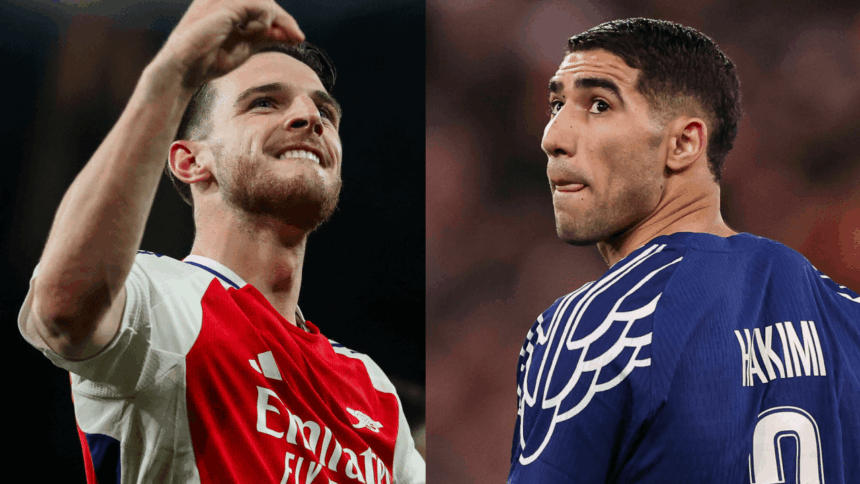Neither club has ever lifted European football’s most coveted trophy, and that absence has loomed large in the identity of both institutions, something opposing fans take a lot of enjoyment out of. The weight of expectation, past failures, and their intertwined stories, particularly through a French lens, make this one of the most culturally charged semi-final ties in recent memory.
For all their stature, both Arsenal and PSG remain members of the “you’ve-never-won-it” club. Arsenal came agonisingly close in 2006, losing 2-1 to Barcelona in a match that still haunts the Gunners’ faithful today. That night in Paris, ironically, is etched into the club’s collective psyche, a missed opportunity that has defined their European narrative since.
PSG’s scars are more recent. The 2020 final in Lisbon saw them fall 1-0 to Bayern Munich, despite being spearheaded by Neymar, Mbappé, and a billion-euro project designed specifically for nights like that. It was supposed to be their moment. Instead, it served as a harsh reminder that money can build the stage, but it can’t guarantee the performance.
Now, both teams find themselves closer than they’ve been in years. Arsenal are back in the Champions League semi-finals for the first time since that 2006 run, with a new identity forged under Mikel Arteta, a team that blends youth, belief, and tactical clarity. PSG, meanwhile, are navigating a post-Galáctico phase with more balance, less glitz, and a squad that finally looks like a team rather than a brand.
This tie isn’t just tactical or historical, it’s personal, especially for Arsenal. The club’s French DNA runs deep, thanks to Arsène Wenger’s 22-year reign. Wenger didn’t just change Arsenal, he changed English football, bringing in a wave of French influence that redefined the club’s playing style, recruitment, and cultural footprint.
Think Thierry Henry, Patrick Vieira, and Robert Pirès, icons who made North London feel like a second home for French football royalty. The football club is still shadowed by their legacy, and this semi-final offers a subtle nod to that era. Arteta, although Spanish, embodies some of Wenger’s core principles: elegant build-up play, technical proficiency, and a commitment to attacking football.
For PSG, the French connection is less nostalgic and more political. As the club that represents France’s capital city, they carry the burden of national expectation. While Marseille remains the only French club to win the Champions League (in 1993), it’s PSG that’s constantly cast as France’s best hope of cementing French football on the international map. Domestically dominant yet internationally unfulfilled, the pressure to win Europe’s top prize is immense, especially given the Qatari investment and the club’s role as a soft-power project for its owners.
Arsenal and PSG couldn’t feel more different in terms of how they’ve built their squads.
Arsenal’s recent resurgence has been built on smart recruitment, patience, and a clear vision. Players like Bukayo Saka, Declan Rice, and Martin Ødegaard represent a generation that grew up watching the club get knocked out of Europe, and are now rewriting that narrative. Their style is slick but grounded in tactical discipline, with an edge that’s been missing since the Invincibles era. We saw against Real Madrid what this team is capable of, and it was special.
PSG, on the other hand, have often relied on individual brilliance. But this version, under Luis Enrique, has transitioned well in the wake of the club’s superstar era, with a solid and well-oiled team that includes Ousmane Dembélé, Khvicha Kvaratskhelia, and the exciting young Désiré Doué breaking through. There’s a sense of hope in Paris; this project has been years in the making, but it looks like the new approach might have been what fans needed all along.
Arsenal, long considered outsiders in Europe, now feel like a genuine powerhouse in the making. PSG, long seen as overhyped pretenders, have quietly matured. They are both trying to outgrow their narratives, and this is a battle that could go either way.
For each side, progression to the final isn’t just about this season, it’s about legacy. Win it all, and they join the elite. Lose, and the “nearly men” tag continues to cling like smoke to a suede jacket.
Should Arsenal win, they will have slain Real Madrid in emphatic fashion and then PSG in back-to-back rounds, a statement run that even opposing fans would have to acknowledge. If PSG advance, they’ll have conquered Liverpool, Aston Villa, and Arsenal, a huge statement to the world that they’re capable of dominance over teams from the Premier League.
Whoever comes out on top won’t just reach the final, they’ll take a decisive step toward rewriting their legacy.
(Images from IMAGO)
You can follow every game from MLS on FotMob – with in-depth stat coverage including xG, shot maps, and player ratings. Download the free app here.
